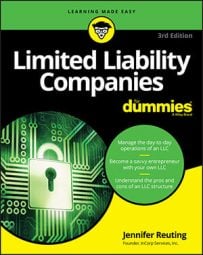S corporation taxation is the corporation’s answer to a pass-through tax status. Just like a corporation can elect S corporation tax status, so can a limited liability company that has elected corporation taxation.
You may think this move is a waste of time considering LLCs already have a pass-through tax status by default, but S corporation taxation differs from partnership taxation on some pretty big issues — namely, in what taxes you pay when you take money out of the company.
If you’re a single-member LLC and therefore not allowed to choose partnership taxation, you’re allowed to elect corporation taxation and then elect to be taxed as an S corporation. This method provides favorable pass-through taxation without the need to take on a partner.
Just be aware that S corporation taxation differs substantially from partnership taxation and, should you take on a partner sometime in the future, you may be restricted in your ability to change back.
Reducing your taxes
S corporations get a pretty big advantage when it comes to taxation, though at first glance the situation looks comparable to partnership taxation status. If you’re a member of an LLC electing partnership taxation, you’re required to pay personal income tax on all company profits that are allocated to you.
In addition to personal income tax, you’re also required to pay a 15.3 percent self-employment tax, which is simply both the employer’s and employee’s shares of Social Security and Medicare taxes.
But with an S corporation, you’re allowed to pay yourself a salary, which is a deductible expense for the company, and any amount over that isn’t subject to self-employment tax. You simply pay personal income tax on those profits and nothing more after they’re allocated to you.
This setup differs substantially from LLCs (which have elected partnership taxation) because all profits you derive from the company in that scenario are subject to the 15.3 percent self-employment tax.
In other words, if you’re taxed as an S corporation, the amount of Medicare and Social Security you pay is limited to the amount you take as a salary. As long as your salary is comparable with others in your position and your industry, any profits the company takes above that amount aren’t subject to extra taxes.
In a nutshell, this designation means you save 15.3 percent in taxes on all profits above an appropriate salary. So if you have a business from which you intend to remove a substantial amount of profits — more than the reasonable salary you’re taking — you’ll probably see some pretty hefty tax savings by electing S corporation taxation.
Dealing with the restrictions
Unfortunately, even if S corporation status is the best choice for you, you may not be able to elect it. When the IRS created the S corporation election, it wanted to make sure that the status was employed by genuinely small businesses and not exploited by large enterprises strictly as a tax-saving strategy. Therefore, you must meet quite a few restrictions in order to take advantage of S corporation taxation:
Your corporation must not have more than 100 shareholders.
Shareholders can only consist of natural persons, individual trusts (for estate-planning purposes), and tax-exempt nonprofit organizations. This list specifically excludes any other entity or business structure, such as limited liability companies or corporations.
Shareholders must be citizens or alien residents of the United States.
The corporation is only allowed to issue one class of stock and all owners are treated equally. You’ll have to save the preferred shares for your IPO.
Banks and insurance companies are barred from being shareholders.
All shareholders must unanimously consent to the S corporation tax designation. In other words, a majority vote just won’t do the trick.
In addition to these ownership restrictions, you may want to take into consideration a few other downsides before committing:
There’s no step-up in basis on assets after you die. When your heirs inherit your assets in an S corporation, they’ll have to pay capital gains tax on the appreciation from the date you first purchased the asset, rather than just from the date that you passed it on to your heirs.
You can’t add debt to your tax basis. Earlier in this chapter, I discuss that LLCs allow tax free distributions to the extent of your tax basis, including the amount of debt the company has that you can be held personally responsible for. With S corporation tax status, you receive no tax benefits for being personally responsible for the company’s debt, unless it’s a loan that you’ve made personally.
These rules (plus many more) make S corporations a bad choice for holding real estate. Even though S corporation status lets you get around the double-taxation nightmare that comes with a regular corporation, you’re still limiting yourself by not being able to personally deduct the mortgage.
Check to see how your state taxes LLCs that elect S corporation taxation. Most states conform with the IRS on this matter, but about a half dozen states tax S corporations as corporations. Don’t underestimate state taxes!
If you’re holding real estate or are in another form of business where double taxation can kill you, you may be in trouble. Make sure to speak with your local accountant or do some research on local state law before making this election.

